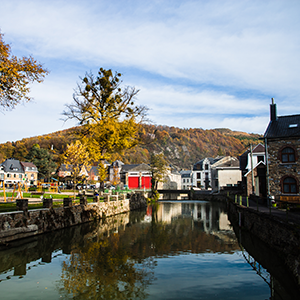Evrehailles
Introduction
The village lies in rolling landscape and extends along three main streets which converge on the church; the latter stands out from the rest with its brick structure and typical bell tower.
The village comprises mainly 18th and 19th-century houses and farms standing close together, often adjoining, built using sandstone and limestone masonry (sometimes covered with coloured whitewash).
Towards the top of the village, the layout is more spacious, with yards or gardens in front of the buildings, as far as the boulevard des Combattants around a vast tree-lined square.
Going down the northern side of the valley, there is the hamlet of BAUCHE, built around the old railway station on the Yvoir-Ciney line, along the Bocq.
History and Heritage
 As early as the 14th century, the Evrehailles estate became part of the municipality of Houx which itself was part of the prevostship of Poilvache and the County of Namur.
As early as the 14th century, the Evrehailles estate became part of the municipality of Houx which itself was part of the prevostship of Poilvache and the County of Namur.
In the 11th century, Evrehailles estate included the Evrehailles land and the below-ground rights for Yvoir-la-Ville, Houzémont, Monceau and Tourment. In 1601, Evrehailles became a high estate, probably in recognition for the services rendered to archdukes Albert and Isabelle by the lord at that time, René de Rosey. By virtue of a grant in 1680, these rights were united to form a single entity. The Evrehailles estate dealt with high, middle and low justice.
During the first half of the 19th century, economic life was dominated by maintaining the traditional steelmaking industry. In 1858, the Gayolle forge, in Evrehailles, still used the motive power of the Bocq and comprised 3 refineries, 1 boiler room and 2 forge hammers. It coexisted with an extraction industry which was maintained well beyond the industrial revolution and which still has an important role today.
Evrehailles ceased to be a municipality when it was merged with Yvoir on 5 May 1964.



